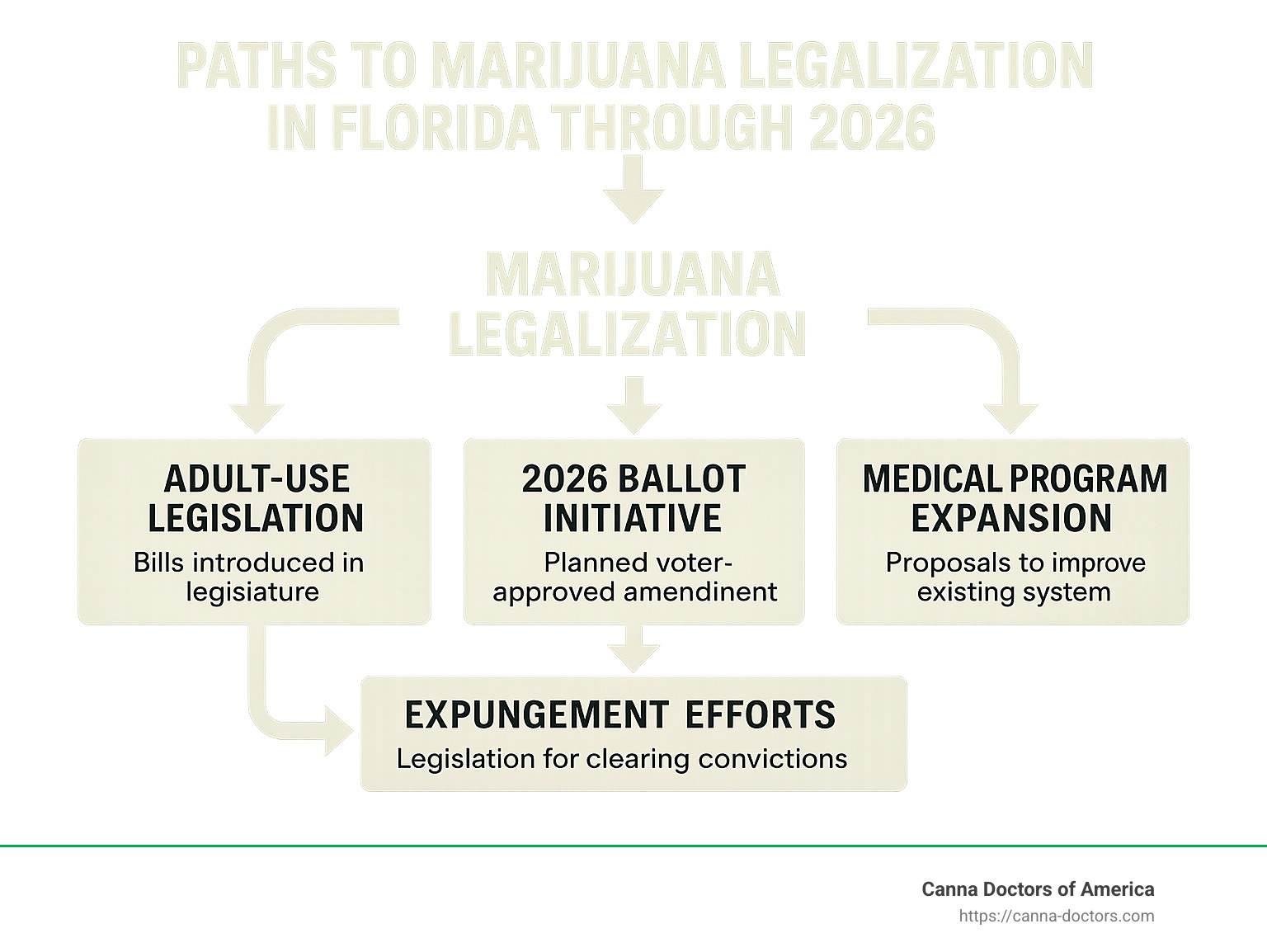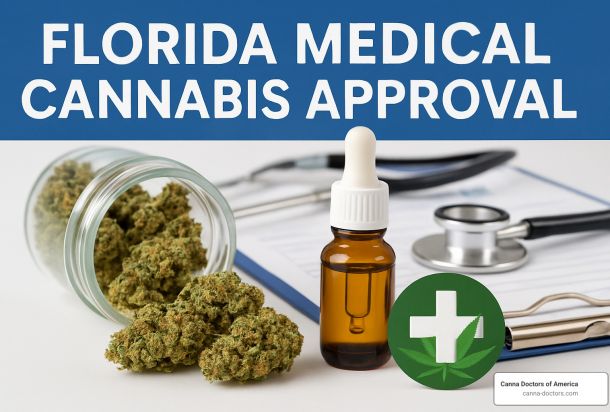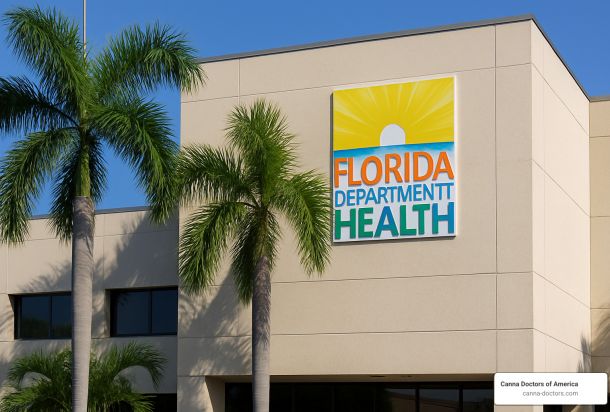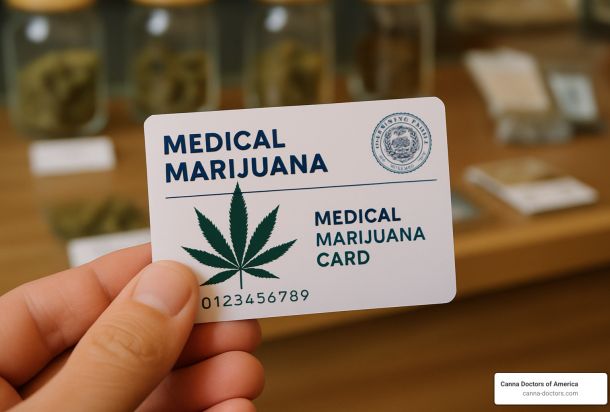Weed in the Sunshine State—What’s Legal and What’s Not
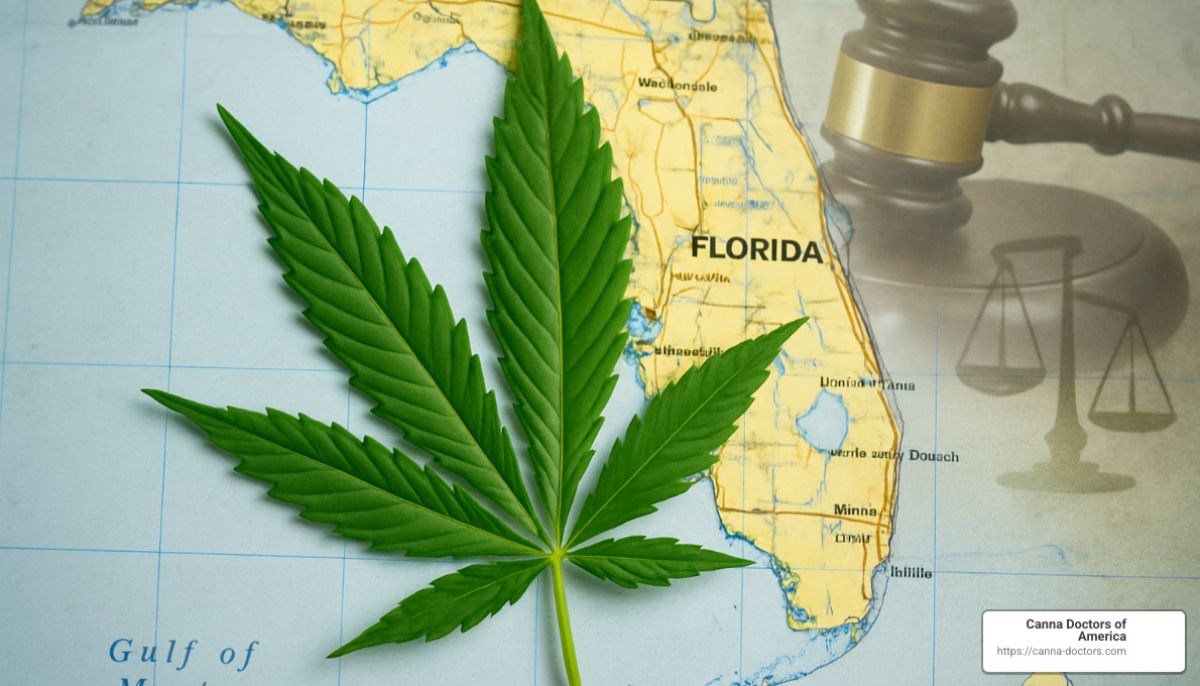
Florida’s Cannabis Legality: The 2025 Reality
Is weed legal in Florida? The short answer is: it depends on your situation.
| Type of Marijuana | Legal Status in Florida (2025) |
|---|---|
| Medical Marijuana | ✅ Legal with state-issued card |
| Recreational Use | ❌ Illegal statewide |
| Hemp-derived Delta-8/9 | ✅ Legal for adults 21+ |
| Home Cultivation | ❌ Illegal (even for patients) |
Navigating Florida’s cannabis laws feels a bit like trying to find your way through a maze. While many neighboring states have acceptd full legalization, Florida continues to take a more measured approach.
In November 2024, many Floridians got their hopes up when Amendment 3 (aimed at legalizing recreational marijuana) received 55.9% support from voters. Unfortunately, that wasn’t enough to clear the 60% supermajority threshold required by Florida’s constitution. So we remain in a state where medical marijuana thrives while recreational use stays firmly on the wrong side of the law.
If you’re confused about where you can and can’t possess cannabis in Florida, you’re not alone. Several forward-thinking cities and counties have created their own decriminalization zones, replacing harsh criminal penalties with more reasonable civil fines for small amounts (typically up to 20 grams). These progressive pockets include major population centers like Miami-Dade, Broward, Palm Beach, Tampa, and Orlando. This creates a patchwork of enforcement that varies dramatically depending on where you’re standing in the Sunshine State.
The legal framework for medical marijuana in Florida is outlined in Chapter 381 of the Florida Statutes, which provides comprehensive regulations for qualified patients. Meanwhile, at the federal level, marijuana remains classified as a Schedule I controlled substance—though enforcement priorities have shifted significantly in recent years.
Hi there, I’m Geoff Massey, Regional Director of Canna Doctors of America. I’ve spent years helping Floridians steer the complex question of “is weed legal in Florida” while guiding thousands of patients through the medical marijuana certification process. Our team of board-certified physicians specializes in properly educating patients about their legal options for cannabis treatment right here in the Sunshine State.
Is Weed Legal in Florida? The 2025 Snapshot
So, is weed legal in Florida in 2025? The straightforward answer is no—at least not for recreational purposes. Despite growing national acceptance and the majority of Florida voters supporting legalization in the 2024 election, recreational cannabis remains prohibited under state law. Amendment 3, which aimed to legalize adult-use marijuana, received 55.9% support in November 2024 but fell short of Florida’s required 60% supermajority threshold for constitutional amendments.
The good news? Medical marijuana is fully legal for qualified patients under Chapter 381 of the Florida Statutes. This robust program was established after 71.3% of voters approved Amendment 2 in 2016, creating a pathway for patients with qualifying conditions to access cannabis legally.
It’s worth noting that marijuana remains classified as a Schedule I controlled substance under federal law, regardless of state regulations. This creates an ongoing legal conflict, though federal enforcement against state-compliant medical users has been minimal in recent years.
Key Differences: Medical vs. Recreational—Is weed legal in Florida for fun?
The distinction between medical and recreational cannabis in Florida is clear-cut and important to understand:
When it comes to medical marijuana, Florida offers a structured, legal program. Qualified patients must register with the state after receiving physician certification for specific qualifying conditions. You’ll need to carry a valid Medical Marijuana Use Registry (MMUR) ID card and make purchases only at licensed Medical Marijuana Treatment Centers (MMTCs). There are possession limits—typically 2.5 ounces of flower per 35-day period—but the good news is medical purchases aren’t subject to the hefty recreational taxes seen in other states.
On the recreational side, cannabis remains fully illegal statewide. Possession of up to 20 grams is a misdemeanor (though you might receive civil citations in some areas instead of criminal charges). Possession of more than 20 grams jumps to a felony charge. And here’s something many people don’t realize: any THC concentrate possession without a medical card—including those vape pens or gummies—is automatically a felony in Florida.
There’s also what locals sometimes playfully call “diet weed”—hemp-derived products containing delta-8 or delta-9 THC that are legally available to adults 21 and over. These products exist in a regulatory gray area following the 2018 Farm Bill and Governor DeSantis’s 2024 veto of a proposed state ban.
Local Loopholes: Decriminalization Zones—Is weed legal in Florida cities?
While recreational marijuana isn’t legal anywhere in Florida at the state level, several municipalities have implemented local decriminalization ordinances. This creates a patchwork of enforcement policies that can be confusing but potentially beneficial if you find yourself in one of these jurisdictions:
In Miami-Dade County, officers may issue a $100 civil citation for possession of up to 20 grams instead of making an arrest. Broward County has implemented a similar system where first offenses for up to 20 grams can result in a $100 fine, with escalating penalties for repeat offenses. Palm Beach County offers civil citations with fines or community service options for small amounts.
The city of Tampa gives officers discretion to issue civil citations with $75 fines for first offenses, while Orlando allows first-time offenders to receive a $100 fine or drug education/community service options instead of criminal charges.
I should emphasize that these ordinances don’t make marijuana legal in these places. They simply give law enforcement the option to issue civil penalties instead of criminal charges for small amounts. Officers still maintain discretion to make arrests under state law, these ordinances typically only apply to small amounts (under 20 grams), and possession near schools or parks may still trigger criminal penalties regardless of local ordinances.
As one Florida criminal defense attorney I spoke with noted, “One feature of Florida’s marijuana laws that is commonly overlooked is that any amount of THC concentrate is a felony. With the advent of concentrates and edibles, felony charges have become extremely common even for personal-use amounts.”
The bottom line? While Florida has made significant progress with its medical program, recreational use remains prohibited—and the consequences can be serious if you’re caught outside the protection of a medical card.
Medical Marijuana in Florida: Who Qualifies and How to Get a Card
The Sunshine State’s medical marijuana program has blossomed into one of the nation’s largest, now serving over 750,000 registered patients across Florida. If you’re wondering “is weed legal in Florida” for medical purposes, the answer is a resounding yes—but only if you qualify and follow the proper steps.
To join Florida’s growing community of medical cannabis patients, you’ll need to meet a few key requirements. First, you must be either a permanent Florida resident or a “snowbird” who spends at least 31 consecutive days in the state each year. Second, you’ll need a diagnosis of a qualifying condition from a state-certified marijuana doctor. Finally, you must register with the state’s Medical Marijuana Use Registry (MMUR) and receive your official ID card.
Florida’s list of qualifying conditions has expanded over the years and now includes serious conditions like cancer, epilepsy, and PTSD. But there’s also flexibility built into the law with a “comparable conditions” clause that allows physicians to recommend cannabis for conditions causing similar symptoms to those specifically listed.
Here’s the full list of qualifying conditions under Florida law:
- Cancer
- Epilepsy and seizure disorders
- Glaucoma
- HIV/AIDS
- Post-traumatic stress disorder (PTSD)
- ALS (Lou Gehrig’s disease)
- Crohn’s disease
- Parkinson’s disease
- Multiple sclerosis
- Terminal conditions diagnosed by a physician
- Chronic nonmalignant pain caused by a qualifying condition
The “comparable conditions” provision has been particularly helpful for patients with anxiety, depression, and other conditions not explicitly named in the statute but who may still benefit from medical cannabis.
Step-by-Step Application
Getting your Florida medical marijuana card isn’t complicated, but it does require following a specific process. Here’s how to steer it:
Step 1: Find a Qualified Physician
Your journey begins with finding a doctor certified by the state to recommend medical marijuana. This isn’t something your regular primary care physician can typically handle—you’ll need a doctor who’s completed the required state training.
At your appointment, the doctor will review your medical history, perform a physical examination, and determine if you have a qualifying condition. Be sure to bring any relevant medical records documenting your condition to help support your case.
Step 2: Receive Your Certification
If the doctor determines you qualify, they’ll enter your information into the state’s Medical Marijuana Use Registry within 24-48 hours. This electronic entry includes specific recommendations for types of products and dosages custom to your condition.
Step 3: Complete Registry Application
Once you’re in the system, you’ll need to complete an application with the Florida Department of Health and pay the $75 state application fee. You’ll provide proof of Florida residency (driver’s license or state ID for permanent residents, or utility bills and lease agreements for seasonal residents) and a passport-style photo.
The application can be submitted online through the MMUR website or by mail if you prefer the old-school approach.
Step 4: Receive Your Card
Now comes the waiting game—but it’s not too long. Most applications are approved within 7-14 business days, and your physical card will arrive by mail within another 7-10 days after approval. The good news is that once you’re approved, you can print a temporary approval from the registry website and start visiting dispensaries right away.
Your medical recommendation must be renewed every 210 days (about 7 months) through another doctor visit, and your card itself must be renewed annually by paying the state fee again.
For parents seeking medical marijuana for minors, the process involves additional steps, including certification from two qualified physicians instead of just one, and designation of a caregiver (typically a parent) who must also apply for their own Caregiver ID card.
What Patients Can Possess & Where
Once you have your card, Florida law sets specific limits on what you can legally possess:
For flower (the traditional smokable form), you’re limited to 2.5 ounces per 35-day period. This must always be stored in its original packaging from the dispensary—no unmarked baggies allowed!
If edibles are more your style, the daily limit is 60 mg of THC, with a maximum 70-day supply of 4,200 mg. For vape products, you can purchase up to 350 mg of THC daily, with a 70-day limit of 24,500 mg.
Where you can use your medicine is just as important as how much you can have. Florida law restricts consumption to private spaces only. This means:
You CAN use medical marijuana in:
- Your own home
- A friend’s home (with their permission)
- Private property where the owner has given consent
You CANNOT use medical marijuana in:
- Public places like parks, beaches, or sidewalks
- Your car, even if you’re just a passenger
- Federal property (which follows federal law regardless of state rules)
- Near schools or daycare centers
- Most workplaces (unless your employer has specifically permitted it)
There’s a small exception for low-THC cannabis (containing less than 0.8% THC), which may be used in public places where smoking isn’t otherwise prohibited—but this isn’t the type of cannabis most patients use for symptom relief.
One important limitation to note: unlike some other medical marijuana states, Florida does not allow patients to grow their own cannabis plants, even for personal medical use. All medical marijuana must be purchased from state-licensed Medical Marijuana Treatment Centers (MMTCs), commonly known as dispensaries.
Want to learn more about qualifying for a medical card? Check out our detailed guides on How Do You Get a Card? and What Medical Conditions Can Marijuana Help With?. For parents, we also have information on Does Florida’s Medical Marijuana Program Include Minors? and for public safety concerns, What Can Medical Patients Legally Possess When in Public?
Recreational Possession, Sales & Penalties
Let’s face it—if you don’t have a medical card in Florida, cannabis possession comes with serious legal risks. Is weed legal in Florida for recreational users? The answer remains a firm no, and the consequences can be life-altering.
Florida’s penalties escalate quickly based on both the amount and type of cannabis:
| Amount | Classification | Potential Penalties |
|---|---|---|
| Up to 20 grams flower | Misdemeanor | Up to 1 year jail, $1,000 fine |
| Over 20 grams flower | Felony | Up to 5 years prison, $5,000 fine |
| ANY amount of concentrate | Felony | Up to 5 years prison, $5,000 fine |
| 25-2,000 pounds | Trafficking | 3-15 years prison, $25,000 fine |
| Over 10,000 pounds | Trafficking | 15-30 years prison, $200,000 fine |
What many visitors and residents don’t realize is that penalties become much harsher if you’re caught within 1,000 feet of schools, parks, or public housing. These “improved zones” can trigger mandatory minimum sentences of 3 years behind bars and fines up to $10,000—even for relatively small amounts.
Beyond the immediate legal trouble, a marijuana conviction in Florida creates ripple effects that can follow you for years. Your driver’s license gets suspended (even if you weren’t driving), professional licenses can be revoked, and finding housing or employment becomes significantly harder. Many people are shocked to learn they may become ineligible for certain government benefits too.
And if you think driving after using cannabis is no big deal, think again. Florida treats marijuana DUIs just like alcohol DUIs: your first offense can mean up to 6 months in jail, fines between $500-$1,000, and 50 hours of community service, plus license suspension and having your vehicle impounded.
One particularly harsh aspect of Florida law that catches many people by surprise: any amount of concentrate is automatically a felony. That innocent-looking vape pen or single edible gummy without a medical card? That’s a potential five-year prison sentence.
What Happens If You’re Arrested
If you find yourself being arrested for marijuana in Florida, how you handle those crucial first moments matters tremendously.
Stay calm and be respectful—hostile behavior only makes things worse. Politely exercise your right to remain silent, as anything you say will likely be used against you later. While you should clearly state that you don’t consent to searches, understand that officers may have other legal grounds to search anyway.
Request an attorney immediately and avoid discussing your case with anyone else. Try to remember details like officer names, badge numbers, and the specifics of the encounter—these could be important later.
In areas with decriminalization ordinances (like Miami-Dade, Tampa, or Orlando), first-time offenders with small amounts might receive civil citations instead of criminal charges. These typically involve fines between $75-$500, with possible alternatives like community service or drug education programs.
There’s some hope on the horizon for those with past marijuana convictions. Several bills have been introduced in the Florida legislature (including S1026 and S1028) that would create pathways for expunging minor marijuana convictions, though these haven’t yet become law.
Selling or Growing Without a License
If possession penalties seem strict, the consequences for selling or growing cannabis without proper licensing in Florida are downright severe.
Selling up to 20 grams is a misdemeanor with up to a year in jail, but selling more than that jumps straight to felony territory with up to 5 years in prison. If you’re caught selling near schools, parks, or other protected areas, you’re looking at an improved felony with up to 15 years behind bars.
As for growing your own plants? Home cultivation remains completely illegal for everyone in Florida—even for registered medical marijuana patients. Unlike states like Michigan or Colorado, Florida provides zero exceptions for patients to grow their own medicine.
The law views cultivation harshly, treating any number of plants as a felony, with penalties based on the total weight including roots and stems. Growing 25+ plants automatically triggers trafficking charges regardless of weight.
There have been legislative attempts to change this. Senate Bill 564 proposed allowing limited home cultivation for medical patients, but it stalled in the legislature. Even the failed Amendment 3 recreational initiative didn’t include provisions for home growing.
Hemp, Delta-8, Delta-9 & “Diet Weed”
Following the 2018 federal Farm Bill, hemp and hemp-derived products containing less than 0.3% delta-9 THC by dry weight became legal nationwide. This created a pathway for what some Floridians call “diet weed” – hemp-derived cannabinoids that produce milder psychoactive effects than traditional marijuana.
Legal hemp-derived products in Florida include:
Delta-8 THC: A cannabinoid naturally present in trace amounts in cannabis that produces milder psychoactive effects than traditional delta-9 THC. Most commercial delta-8 is synthesized from hemp-derived CBD.
Hemp-derived Delta-9 THC: Products containing delta-9 THC (the main psychoactive compound in marijuana) are legal if they contain less than 0.3% delta-9 THC by dry weight and are derived from hemp.
HHC (Hexahydrocannabinol): A semi-synthetic cannabinoid produced from hemp that offers effects similar to THC.
CBD (Cannabidiol): A non-intoxicating cannabinoid widely available in Florida.
In 2024, the Florida legislature passed Senate Bill 1698, which would have banned delta-8 and similar products, but Governor Ron DeSantis vetoed the bill, keeping these products legal for adults 21 and over.
These hemp-derived products lack the same regulatory oversight as medical marijuana. The FDA has issued warnings about delta-8 THC products, noting concerns about:
- Variable product potency
- Potentially harmful manufacturing byproducts
- Misleading labeling
- Marketing that appeals to children
- Adverse events including hospitalizations
Comparing Hemp THC vs Marijuana THC
While hemp-derived THC products and medical marijuana both contain psychoactive compounds, there are important differences:
| Aspect | Hemp-Derived Delta-8/9 | Medical Marijuana |
|---|---|---|
| Legal Status | Legal for adults 21+ | Requires medical card |
| Source | Derived from hemp plants | Derived from marijuana plants |
| Production | Often synthesized from CBD | Naturally occurring in plant |
| Potency | Generally milder effects | Typically stronger effects |
| Regulation | Minimal oversight | Strict testing requirements |
| Purchase Location | Smoke shops, gas stations, online | Licensed dispensaries only |
| Age Requirement | 21+ | 18+ with card (or minor with caregiver) |
As Forbes Health notes: “Delta 9 THC can be smoked or vaporized in flower (bud) form without requiring extraction, although edibles, topicals and other preparations do require an extraction process. On the other hand, nearly all delta 8 THC products are synthesized, extracted and purified from cannabis-sourced CBD.”
For many Floridians without access to medical marijuana, these hemp-derived alternatives provide a legal option, though medical experts generally recommend the more regulated medical cannabis program for therapeutic use.
Buying, Using & Traveling: Practical Rules for 2025
If you’re wondering where to legally purchase marijuana in Florida, the answer is straightforward: only through licensed Medical Marijuana Treatment Centers (MMTCs) with a valid medical card. As we move through 2025, Florida’s medical cannabis landscape continues to expand, with over 620 dispensary locations now scattered across the Sunshine State.
These dispensaries offer everything a patient might need—from traditional flower to modern consumption methods. You’ll find smokable cannabis, vape products, edibles like gummies and chocolates, tinctures, topicals for pain relief, and various concentrates. Many patients appreciate that most dispensaries now offer convenient curbside pickup and home delivery services, making access easier for those with mobility challenges or busy schedules.
One practical challenge remains: most dispensaries operate primarily as cash-only businesses due to ongoing federal banking restrictions, though some have managed to implement debit card processing systems. It’s always smart to check payment options before visiting.
For those seeking hemp-derived alternatives like delta-8 products, the shopping experience looks quite different. These “diet weed” options are available at smoke shops, CBD specialty stores, certain gas stations, and through online retailers—all without requiring a medical card (though you must be 21+).
When it comes to consumption, Florida maintains strict boundaries on where cannabis can be used. Public consumption remains firmly prohibited, even for medical patients. This means parks, beaches, sidewalks, and other public spaces are off-limits for medicating. The Florida Clean Air Act further restricts options by banning smoking in most indoor public places, including restaurants and most bars (with limited exceptions for standalone bars that meet specific criteria).
If you’re staying in a hotel or rental property, don’t assume cannabis use is permitted. Many properties explicitly prohibit it in their policies, and this prohibition can legally extend to medical patients. Always check policies before medicating to avoid unpleasant surprises or potential eviction.
Air travelers face additional complications. Since airports and air travel fall under federal jurisdiction, it remains illegal to carry marijuana through security checkpoints or onto planes—even with a valid Florida medical card. TSA’s primary mission isn’t searching for drugs, but if they find cannabis during routine screening, they’re required to report it to local law enforcement.
Driving & Boating Under the Influence
Florida takes impaired driving seriously, regardless of whether the substance is alcohol or cannabis. Is weed legal in Florida while driving? Absolutely not—even for medical patients.
The law treats marijuana-impaired driving similarly to alcohol impairment, though with some important differences. Unlike alcohol’s clear 0.08% blood alcohol concentration limit, there’s no established threshold for THC in the bloodstream that automatically constitutes impairment. Instead, officers rely on field sobriety tests, observation of behavior, and specially trained drug recognition experts to establish impairment.
Under Florida’s implied consent laws, drivers must submit to blood or urine tests if lawfully arrested for suspected impairment. Refusing these tests can result in automatic license suspension, regardless of whether you were actually impaired.
Having a medical marijuana card provides no protection against DUI charges. The law focuses on impairment, not whether you’re legally permitted to use the substance.
The penalties for marijuana DUI mirror those for alcohol and include jail time (up to 6 months for first offense), substantial fines ($500-$1,000), community service requirements, license suspension for at least 6 months, and mandatory substance abuse evaluation and treatment. Your vehicle may also be impounded for 10 days, and penalties increase dramatically for subsequent offenses.
Medical patients face a particular challenge: THC can remain detectable in blood and urine long after impairment has subsided, potentially leading to complicated legal situations even when following doctor’s recommendations.
Interstate & Out-of-State Cards
If you’re visiting Florida with a medical marijuana card from another state, I have disappointing news: Florida does not offer reciprocity for out-of-state medical cards. This means visitors cannot legally purchase from Florida dispensaries or possess marijuana in Florida based on their home state’s authorization.
Similarly, if you’re a Florida medical patient planning to travel, your Florida card holds no legal weight in other states unless they specifically offer reciprocity. More importantly, transporting marijuana across state lines remains a federal offense, regardless of both states’ laws.
For tourists or visitors with medical needs, Florida does offer some options:
- Seasonal residents who live in Florida at least 31 consecutive days per year can apply for a Florida medical card
- Non-residents must wait until they meet the 31-day requirement to qualify
- Hemp-derived CBD products remain legal for all adults and can be transported across state lines
- Delta-8 and similar hemp-derived products offer legal alternatives for adults 21+
As one Florida attorney I spoke with puts it: “If you’re visiting Florida for the holidays and hoping to light up a joint before or after your Christmas dinner, it has to be ‘diet’ weed to be legal weed.”
The landscape of is weed legal in Florida continues to evolve, but understanding these practical rules will help both residents and visitors steer the current reality safely and legally.
What’s Next? Legislative Outlook Through 2026
The cannabis reform journey in Florida is far from over, despite Amendment 3’s narrow defeat in 2024. With 55.9% of voters supporting legalization—just shy of the required 60% threshold—momentum continues to build for meaningful change in the Sunshine State’s marijuana laws.
House Bill H0555 and its companion legislation represent the most direct legislative path to adult-use cannabis. These bills would establish a comprehensive framework for recreational marijuana, though they face steep challenges in Florida’s conservative-leaning legislature. As one lawmaker put it, “The voters have spoken clearly—they want reform, even if we didn’t quite reach the constitutional amendment threshold.”
The Smart & Safe Florida campaign isn’t giving up either. They’re already crafting a refined ballot initiative for 2026, incorporating lessons learned from the 2024 effort. Campaign organizers feel optimistic that the presidential election year turnout could provide the boost needed to finally cross that 60% threshold. “We came incredibly close,” noted one campaign director. “With some tweaks to address voters’ concerns and higher turnout, 2026 could be Florida’s year for legalization.”
Beyond full legalization, several targeted reform efforts show promise:
Criminal Justice Reform is gaining traction through Senate Bills S1026 and S1028, which would create pathways for expunging minor marijuana convictions. These measures could provide relief to thousands of Floridians whose lives have been impacted by past marijuana enforcement—disproportionately affecting communities of color.
Workplace protections for medical marijuana patients are also on the legislative agenda. Proposed bills would shield public-sector employees from discrimination based on their legal medical cannabis use, though private employers would retain significant discretion over their drug policies.
The medical marijuana program itself could see meaningful improvements through various proposed measures:
- Extending patient recommendations from 210 days to two full years
- Allowing telemedicine for renewal appointments (currently in-person only)
- Creating fee waivers for veterans accessing the program
- Expanding the list of qualifying medical conditions
- Permitting limited home cultivation for registered patients
Perhaps most promising is Senate Bill 564, which would allow medical patients to grow up to six plants at home—a significant shift from Florida’s current complete ban on home cultivation. “For patients with serious conditions, growing their own medicine could provide both financial relief and peace of mind,” explained one patient advocate.
The political landscape remains complex, with Florida’s cannabis future caught between growing public support and institutional resistance. Recent polling shows nearly 70% of Floridians now support some form of legalization, creating increasing pressure on lawmakers to respond.
“This moment represents a perfect opportunity for lawmakers to listen to their constituents,” noted one cannabis policy analyst. “The question isn’t really ‘is weed legal in Florida?’ anymore—it’s ‘when and how will Florida’s laws catch up with public opinion?'”
Frequently Asked Questions about Florida Weed Laws
Can I use medical weed in public parks or beaches?
No, you can’t light up that medical marijuana at your favorite beach or park. Florida law is crystal clear on this point – medical marijuana use is restricted to private property only.
Think of it this way: your medical card gives you the legal right to use cannabis as medicine, but not the right to use it anywhere you please. Public spaces like parks, beaches, boardwalks, and recreational areas are all off-limits for consumption.
There is one tiny exception worth noting. If you’re using low-THC cannabis (containing less than 0.8% THC), you might be able to use it in public places where smoking isn’t already prohibited. But for standard medical marijuana with higher THC content? That’s strictly a behind-closed-doors affair.
The safest approach is simple: save your medication for home or another private space where you have explicit permission from the property owner.
How much weed can I carry on me with a card?
With your Florida medical marijuana card safely in your wallet, the state allows you to possess specific amounts of cannabis – but these limits are quite strict.
For flower (the smokable form), you can legally carry up to 2.5 ounces per 35-day period. This isn’t just a suggestion – it’s tracked through the state registry system when you make purchases.
For other products, the limits work differently:
- Edibles: Up to 60 mg of THC daily (with a 70-day supply limit of 4,200 mg)
- Inhalation products like vapes: Up to 350 mg of THC daily (with a 70-day supply limit of 24,500 mg)
Always keep your products in their original dispensary packaging – this is actually required by law. And remember that your Medical Marijuana Use Registry ID card should always accompany your cannabis products. If you’re stopped without your card, those legal products could suddenly become very illegal.
Are vape cartridges really a felony if I don’t have a card?
Yes – and this surprises many Floridians. While small amounts of flower marijuana (under 20 grams) without a card is a misdemeanor, any amount of marijuana concentrate is automatically a felony offense if you don’t have a medical card.
This means that single vape pen in your pocket? Felony. That gummy edible? Felony. A tiny dab of wax or shatter? You guessed it – felony.
The penalties are no joke either – up to 5 years in prison and fines reaching $5,000. This harsh reality catches many visitors and residents off guard, especially those from states with more relaxed cannabis laws.
As one Florida criminal defense attorney explained: “One feature of Florida’s marijuana laws that is commonly overlooked is that any amount of THC concentrate is a felony. With the advent of concentrates and edibles, felony charges have become extremely common even for personal-use amounts.”
This stark difference in how Florida law treats flower versus concentrates creates a serious legal trap for the unwary. Many people assume that small amounts of any cannabis product would be treated similarly, but that’s simply not the case under current Florida law.
For those without a medical card who still want to explore cannabis effects, legal hemp-derived products like delta-8 THC remain an option – though they’re not subject to the same quality controls as medical marijuana.
Conclusion
Florida’s relationship with cannabis continues to evolve through a complex dance of public opinion and conservative policy. While most Floridians voted for recreational legalization in 2024, the 55.9% support fell short of the required 60% threshold—leaving the state in a unique position where medical marijuana thrives while recreational use remains prohibited.
If you’re wondering “is weed legal in Florida?” in 2025, the answer depends entirely on your situation. For hundreds of thousands of qualified patients, medical marijuana provides legal, regulated access to cannabis through the state’s comprehensive program. For adults without medical cards, hemp-derived alternatives like delta-8 and low-concentration delta-9 products offer a legal (if less regulated) option.
What’s clear is that Florida’s cannabis laws are still very much a work in progress. The failed Amendment 3 initiative hasn’t ended the conversation—it’s simply pushed it forward to the next chapter. Lawmakers continue introducing bills to expand patient protections, reform criminal penalties, and potentially create adult-use frameworks. Meanwhile, advocacy groups are already laying groundwork for another ballot initiative in 2026.
For those suffering from qualifying conditions who haven’t yet explored medical marijuana as a treatment option, the process of obtaining your card is straightforward but requires proper guidance. At Canna Doctors of America, we’ve helped thousands of Floridians steer this journey through our Tampa, St. Petersburg, and Clearwater clinics. Our physicians focus on education and personalized care, ensuring patients understand both the benefits and legal parameters of medical cannabis use.
While we wait to see how Florida’s cannabis story unfolds in the coming years, the most important thing for residents and visitors alike is staying informed about current laws. The penalties for non-compliance remain serious—particularly for concentrates and amounts over 20 grams—making it essential to understand exactly where you stand under state law.
The future of cannabis in Florida looks increasingly green, but for now, knowing and following the rules is your best protection in this evolving landscape.





